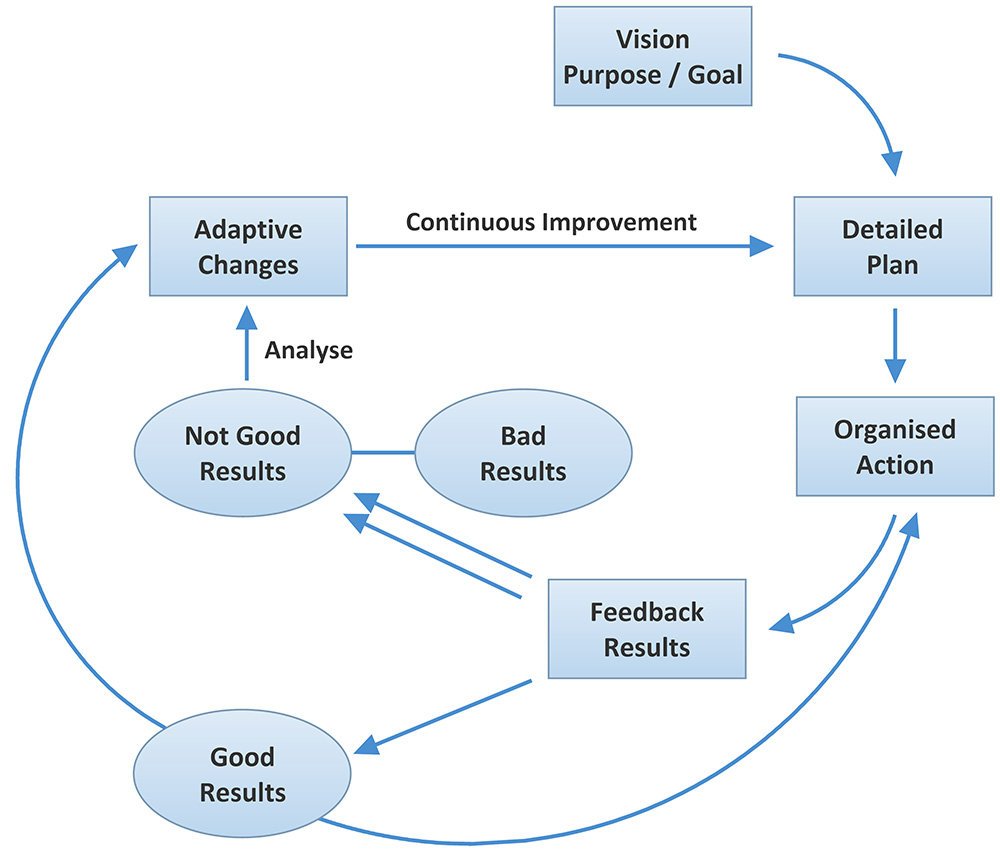Eight Part Success Strategy
Eight Part Success Strategy
Success is not an event.
The process of being successful may best be understood by looking at this diagram.
If you study it carefully you will see it consists of eight main ideas.

1. You need to decide the goal, purpose or vision, the achievement of which would constitute success, in your mind. This may be anything from "Earn a million pounds" to "Find peace of mind".
2. You need to formulate a detailed written plan that you think may be capable of achieving this goal.
3. You need to implement the plan in an organised and intelligent manner.
4. You need to listen out and observe the POSITIVE feedback results your current actions are producing.
5. You need to observe and measure the NEGATIVE feedback results your current actions are producing.
6. You need to analyse your negative feedback and think of ways to improve and adapt your plan, in order to improve the feedback results your actions are creating.
7. You need to analyse what is going well and see if you could improve it, and make it even better.
8. You need to keep repeating the process until you achieve your original goal, and then you should set a new, higher level, goal.
Using the formula to inspire others.
This model suggests eight leadership questions that need to be continually asked by you and answered by your team.
1. What is the vision, the goal, the purpose of this organisation?
2. How detailed are our plans which are designed to help us achieve our purpose?
3. How are we currently organised to effectively implement our plan?
4. By what means are we measuring our feedback results?
5. What positive feedback are we currently getting from our stakeholders?
6. What negative feedback are we currently getting from our stakeholders?
7. In relation to the negative feedback, what adaptive changes do we need to make to our current plan of action, that will get us back on track and take us to our goals?
8. In relation to positive feedback, what further adaptive changes might we consider in pursuit of continuous improvement?
Memorise and ask these questions to your team and expect good answers in return.
By doing this every day, you will cause them to be more successful, and that would be good for everyone.
Definition: Eight Part Success Strategy
The Eight Part Success Strategy is a business leadership framework. It starts when you fix a clear goal, shape a full written plan, and act in an ordered way. You then measure good and bad feedback, change what fails, build on what works, and repeat the cycle until the goal is won and a higher one is set.
Show CG4D Definition
- Starts with a clear, fixed goal
- Demands a detailed written plan
- Measures both good and bad feedback during action
- Repeats the change-and-act loop until the goal is met and a higher goal is set
Article Summary
Success works as a simple cycle: set a clear goal, write a plan, act with order, track good and bad results, fix what fails, build on what works, then run the loop again until you hit the goal and set a new one.
Frequently Asked Questions
Here are some questions that frequently get asked about this topic during our training sessions.
What are the eight steps in the success strategy?
Why should I write my goal instead of keeping it in mind?
How often should I review feedback during implementation?
What is the best way to respond to negative feedback?
When should I set a new, higher goal?
Can the eight-step model guide a whole team?
What is the main benefit of repeating the cycle?
Thought of something that's not been answered?
Did You Know: Key Statistics
A 2024 Harvard Business Review study finds teams that write clear, shared goals lift output by 21% within six months. Gallup’s 2024 State of the Global Workplace report shows staff who get weekly feedback are three times more likely to feel engaged at work.Blogs by Email
Do you want to receive an email whenever we post a new blog? The blogs contain article 5-10 minutes long - ideal for reading during your coffee break!
Further Reading in Leadership and Management
-
Avoiding Guesswork in Business
Ditch gut feeling. Learn how evidence based decisions cut risk, lift revenue and build trust. Use data, logic and training to guide leadership success.
Read Article > -
Leadership Training Skills: The Magnificent Seven Questions
Explore leadership skills training. Apply the Success Formula's seven questions to set goals, plan actions, use feedback and drive steady improvement.
Read Article > -
What Does Leadership Mean to You?
Discover six leadership skills, the power of rational leadership, memory training and a five-step success process to inspire teams and hit goals every day.
Read Article > -
Who Are The Best Leaders In Business? (What Makes A Great Leader?) [Infographic]
Discover what makes a great business leader. Explore key leadership skills, real examples such as Branson and Zuckerberg, plus expert guidance for your success.
Read Article > -
Leadership and management development
Discover how self motivation for leaders builds a strong leadership mindset, boosts self confidence in management and drives team motivation in every climate.
Read Article >
Looking for Leadership and Management Training?
Looking for Leadership Training London? If so, you may find this Leadership and Management Training Course beneficial:
Open Training Course Pricing and Availability
Next Open Course Starts in 13 days, Manchester City, places available







